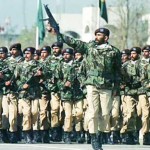IDR Blog
Kulbhushan Jadhav Case: Game of Smoke and Mirrors: Who blinks first?
The high stakes and tight time frame for India to save its son, Kulbhushan Jadhav, from execution after a farcical trial conducted by a kangaroo military court, has brought India-Pakistan relations once more to the brink. In this dangerous smoke and mirrors game, the Pakistan ‘Deep State’ appears to have boxed itself into a corner.
The Pakistani military’s efforts to shift the blame on the civilian Nawaz Sharif government for defending the case in the International Court of Justice (ICJ) at The Hague, instead of rejecting its jurisdiction as the military would have preferred, has made the situation more complex.
Pakistan’s Foreign Policy Adviser Sartaj Aziz’s latest assertion that ICJ cannot acquit Kulbhushan Yadav has led many to fear that he might already be dead or mentally unsound because of sustained torture. Is that the real reason why consular access has been repeatedly denied? Can India save Commander Jadhav?
India’s decision to approach the ICJ regarding repeated violation of Vienna Convention by Pakistan on the Jadhav case was a brilliant move. A timely conversation by India with the ICJ Registrar resulted in Judge Ronny Abraham, President of the Court, immediately writing to Prime Minister Nawaz Sharif to delay the execution till the Court could schedule a hearing and adopt provisional measures. The hearing at such short notice was unprecedented. It demonstrated that the Court shares India’s anxiety that the execution was imminent. Pakistan was taken aback and caught on the backfoot.
The Pakistani side was represented by a British barrister of Pakistani origin, Khawar Quereshi, who spoke for only 40 minutes instead of 90 allocated to each side. Wearing a barrister’s wig and speaking with a marked British accent, Quereshi, who reportedly was paid Rupees 10 crores (100 million) by Pakistan for one hearing, was unable to convince the Court that the Vienna Convention had not been violated and that Jadhav had been given a fair trial.
The court also accepted India’s contention that a video reportedly containing Jadhav’s confession not be admitted as evidence. Speaking for India, ace lawyer Harish Salve’s arguments had an immediate connect with the 15-member Court. Salve incidentally has refused to accept any fee from the Indian government. The court rejected Pakistan’s argument that it did not have jurisdiction over the case. “It is appropriate for the court to order that Pakistan take all measures at its disposal to ensure Mr Jadhav is not executed before this court has given its final decision,” Court President Ronny Abraham noted, adding: “India has the right to seek consular access for Jadhav.”
While India celebrated the interim verdict of the Court, the country was keenly aware that Jadhav’s life was hanging on a string. Conflicting statements emanating from Pakistan added to the confusion. While Consul Quereshi had stated in court that there was no immediate danger of execution to Jadhav, Aziz’s assertion that domestic law will prevail with regard to the execution was worrisome to say the least. Jadhav has not been allowed, to the best of India’s knowledge, to file a mercy petition. It has been done on his behalf and handed over by India’s High Commission in Islamabad to the Pakistani Foreign Secretary. The deadline for submission of the petition was over at midnight on Saturday, 20 May, 2017.
What happens now? Who blinks first? Given the dislike of international judicial bodies for the death penalty after the adoption of the ‘Optional Protocol’ on its abolition, it seems likely that the final ruling will go in India’s favour. Can Pakistan defy the provisional measures or a final ruling of the ICJ, staying the death penalty?
Established in 1945 by the UN Charter, the ICJ was the successor to the Permanent Court of International Justice. Article 94 of its Charter establishes the duty of all UN Member States to comply with decisions of the Court involving them. The judgement is therefore binding on Pakistan. If parties do not comply, the issue may be taken before the Security Council for enforcement action. Chapter XIV of the United Nations Charter authorizes the UN Security Council to enforce Court rulings. Should either party fail “to perform the obligations incumbent upon it under a judgement rendered by the Court”, the Security Council may be called upon to “make recommendations or decide upon measures” if the Security Council deems such actions necessary.
There has been media speculation that in case the ICJ in its final ruling stays the execution, Pakistan would execute Jadhav and depend on a Chinese veto to save itself from Security Council’s ‘enforcement action’. This is by no means an automatic action by China. The provisional measures had been unanimously adopted by all 15 judges. There had been no dissenting judgment by the influential Chinese judge, Xue Hanqin. The veto has been very rarely exercised by China. The rest is a matter of speculation.
In this game of smoke and mirrors, one can only hope and pray that a back channel mediated compromise can be worked out. It could be in two forms which have been hinted at by India’s Harish Salve. Restitution or a fair trial in Pakistan’s civilian courts. The latter, as Salve acknowledged, was India’s option ‘B’. What was left unsaid was whether the Pakistan ‘Deep State’ would let this happen. At this moment, it is as imponderable as Jadhav’s fate.




